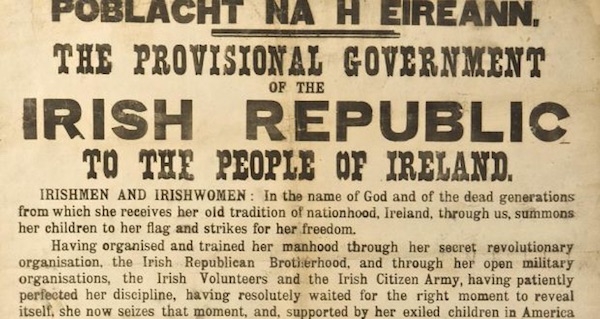
By Brian Feeney (for Irish News)
Blood thought he knew the native mind;
He said you must be firm, but kind.
A mutiny resulted.
He stood upon a little mound
Cast his lethargic eyes around,
And said beneath his breath:
‘Whatever happens, we have got
The Maxim Gun, and they have not.’
The belt-fed Maxim fired 550 rounds a minute. One soldier could operate it. The British mainly, but the French and Germans wrought havoc with it in Africa in the last twenty years of the nineteenth century until the Germans came up with a better machine gun.
There’s a lot of balderdash talked in the last couple of weeks about the Easter Rising being ‘undemocratic’. So it was as people today view democracy.
However that doesn’t mean the existing government in Ireland was democratic. It wasn’t, not in our terms today, that is.
It is utterly ridiculous and a childish, unhistorical cardinal error to project the values of the twenty-first century backwards onto the early years of the nineteenth century.
In Ireland in 1916 women didn’t have the vote and they, as always, were the majority of the population.
A lot of men didn’t have the vote either. It’s no good saying, ‘ah but people in 1916 thought they were living in a democracy’. No they didn’t.
The suffragettes who were protesting and campaigning didn’t. Republicans didn’t. Furthermore the nationalists who’d been denied Home Rule by a seditious conspiracy led by the Conservative party using Ulster Unionists as their armed wing felt it necessary to arm in turn to try to insist on the authority of the British parliament being enforced. Fat chance.
Ronan Fanning, Emeritus Professor of History at UCD has demonstrated conclusively in his recent books, especially Fatal Path, that there was no prospect of Britain granting Irish independence before, and certainly not after, the First World War.
The Rising set the train in motion because the British responded as they always did when ‘a mutiny resulted’ because they ‘knew the native mind’ and had the Maxim gun.
Curiously, people who condemn the Rising as ‘undemocratic’ never explain where Britain gained its democratic mandate to govern Ireland. Surely not the Act of Union?
Curiously they never condemn the American War of Independence strongly objected to by American loyalists. As Fanning asked, did the American bicentenary in 1976 conceal the revolt against the British or did the French bicentenary in 1989 deny the bloodshed of the French Revolution? That’s the way it was in days of empire.
In the twentieth century scores of nationalities had risen against colonial or imperial rulers or both: British, French, Spanish, Austrian, Dutch. Did any of them have a democratic mandate?
It’s just otiose to ask. Even if there had been free elections and in most cases there weren’t, what chance any party campaigning for a mandate to overthrow the government in a revolution?
So transposing our values backwards a century is a nonsense. You may as well start condemning the Germans for denying human rights to the Belgians in 1914.
The human rights industry hadn’t been invented any more than the notion of free universal suffrage.
How about condemning Asquith’s government for not introducing same-sex marriage? Instead, let’s look at the way people thought in 1916 after a nineteenth century of wars and uprisings from which emerged a Greek state, a German state, an Italian state, to name a few.
The people behind the Rising as presented in the Proclamation of the Republic were looking for a new society with equality for men and women, (and it should be pointed out that only Sinn Fein and Connolly’s labour movement allowed women members), and a new economic future none of which materialised after 1923.
At least they looked to a society preferable to the one run from Dublin Castle which halved the Irish population since the Act of Union.
In that context it’s a bit rich for unionists to condemn 1916 when they took up arms in 1912 to fight to avoid living on equal terms with the rest of the people on the island.
Compared to the Proclamation the Ulster Covenant, both in its archaic mock seventeenth century language and in its objectives, is an attempted retreat into the Dark Ages.
![[Irish Republican News]](https://republican-news.org/graphics/title_gifs/rn.gif)
![[Irish Republican News]](https://republican-news.org/graphics/title_gifs/harp.gif)

